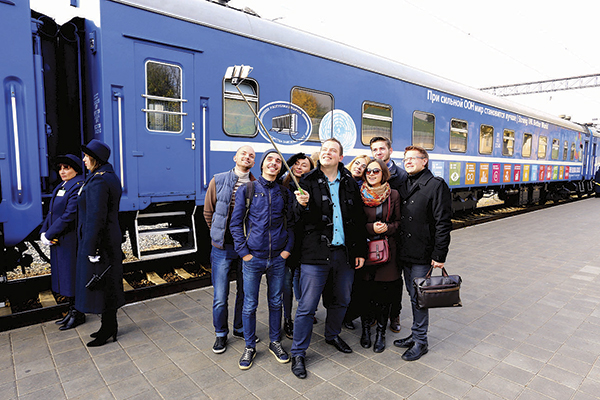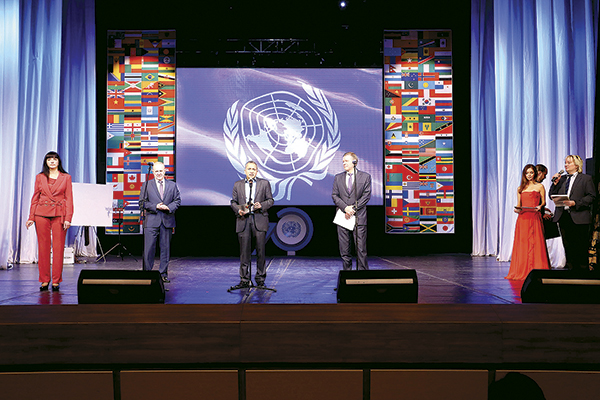
UN activity becomes more noticeable
It was an unforgettable eight-day trip for all participants. The UN Train visited seven cities and involved more than 150,000 persons in its activities all over the country. At the same time, it touched the hearts and minds of hundred thousand people even beyond Belarusian borders through social media. What next? Yes, the UN Express helped people know about the SDGs. However, UN Express participants also had many conversations with people from all walks of life on how the country will achieve these 17 goals by 2030 together. Now, it is about actions. Already in the first week since the return of the train, UN Express participants have had many events in Minsk focused on different SDGs ranging from a play called ‘Seven’ on gender inequality and gender-based violence, Kastryčnicky Ekanamičny Forum (KEF) bringing global expertise to discuss opportunities and challenges for Belarus and an international conference on how Public Private Partnerships can work for SDGs. On 20th November United Nations will present to the highest levels of the Government the ‘SDGs and the Voices of the People’ — a collection of ideas, suggestions, comments and concerns of people from all around the country who were involved with the Train on how they see themselves and others contributing to the achievement of the SDGs. Using this as a point of departure, United Nations will together with a cross-section of public servants examine the role of the civil service in the implementation of these Global Goals. Prominent experts from Kazakhstan, UK, Denmark and Belarus among others will gather to discuss international best practices at the Academy of Public Administration under the aegis of the President of Belarus.

Back in 2000, the United Nations established a series of eight goals to help the world’s poorest people. The Millennium Development Goals (MDGs), as they were known, were an attempt to address the most basic requirements of human life: reducing the child-mortality rate by two-thirds, reversing the course of the AIDS epidemic, vastly increasing the number of people with regular access to safe drinking water. Other targets sought to move closer to a world without poverty or hunger, in which common diseases have been defeated — a world with universal primary education, gender equality, improved maternal health, and environmental sustainability.
Taken together, the MDGs, which were meant to be completed by the end of this year, can be regarded as the largest collective promise that the world’s governments have ever made to their citizens. Depending upon how one interprets the words in the goals, progress has been mixed. We have not been able to lower maternal mortality by two-thirds. While improved drinking water has been extended to more than 2.6 billion people since 1990 — a remarkable accomplishment — more than six hundred and fifty million still lack access to safe water, and nearly a billion people have no sanitation facilities at all. Moreover, it concerns almost every of the eight set goals and their targets. Nonetheless, as the MDGs deadline approaches, a lot more has to be done from our side.
This September, the UN met to ratify a much broader set of targets — this time called the Sustainable Development Goals — which many UN member states will use or have used already to frame their agendas and political policies in the next fifteen years. Officially, there are seventeen new goals — and the environment, which was all but ignored in the last round, will receive much-needed attention. But with scores of countries participating in consultations, there are now hundreds of targets, sub-targets, and ancillary targets within the over-all goals.

In fact, the new goals are the result of a three-year process involving 83 national surveys engaging over 7 million people, making it the biggest consultation in UN history. Belarus was one of the significant contributors in this regard. More than 15,000 took part in the ‘MY World’ global survey forming the idea of what Belarus needs to address. This number is significant taking into account the country’s population. The results of the survey were also incorporated into the 5-year Programme of Socio-economic Development, which is part of the National Strategy Document.
Concluding a negotiating process that has spanned more than two years and featured the unprecedented participation of civil society, governments united behind an ambitious agenda that features 17 new sustainable development goals (SDGs) and 169 targets.
SDGs will be launched in January 2016, but it was decided to act even before they go live. Prior to the UN70 Express departure, non-binding Declaration in support of SDGs and UNDAF was prepared. Seven Governors signed this Declaration along with the Chiefs of the UN Country Team Agencies represented in Belarus. It is the way forward to achieve the SDGs in Belarus by 2030. The same as it is a declaration of full support by local authorities of the UN Development Assistance Framework for Belarus that aims at four major topics within the next 5 years: Good Governance, Sustainable Economic & Human Development and Environment.

On the same Day (20 November) shall the UN altogether mark the Universal Children’s Day. Nearly 25 years ago, the world made a promise to children that it would do everything in its power to protect and promote their rights to survive and thrive, to learn and grow, to make their voices heard and to reach their full potential. According to the UN Secretary-General, ‘The one thing all children have in common is their rights. Every child has the right to survive and thrive, to be educated, to be free from violence and abuse, to participate and to be heard’. Therefore, on this very day the UN in Belarus starts its 3-week support for SDGs campaign that will culminate on 10 December — Human Rights Day. These 21-day SDGs round includes International Day for the Elimination of Violence against Women (25 November), World Aids Day (1 December), International Day for the Abolition of Slavery (2 December), International Day of Persons with Disabilities (3 December), World Soil Day (4December), International Volunteer Day (5 December) and International Day of Commemoration and Dignity of the Victims of the Crime of Genocide (9 December).Not to leave any behind, United Nations in Belarus planned a bunch of events like HIV/AIDS testing campaigns, conferences, round tables and much more.
Watch close the UN in Belarus through Social Media pages you use the most and through other available sources to stay updated and informed!
By Viktor Mikhailov











